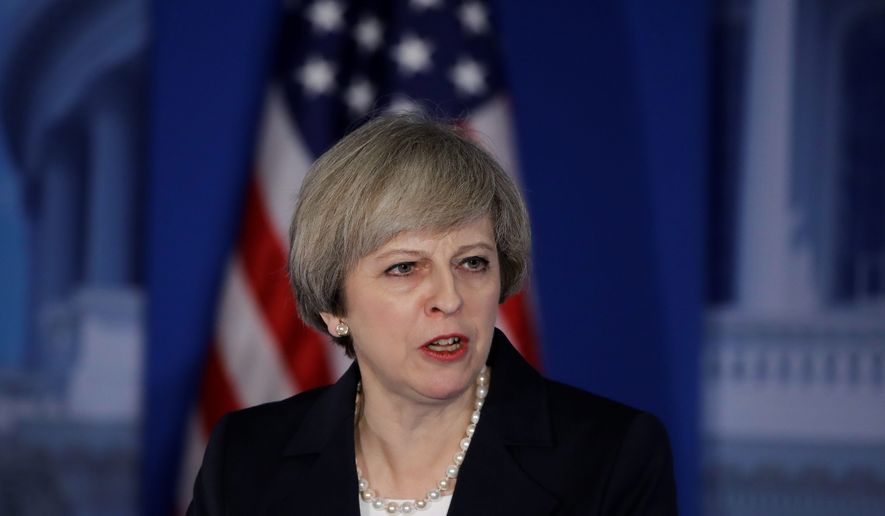The meeting of President Trump and British Prime Minister Teresa May on Friday — the first foreign leader the new U.S. president is hosting at the White House — will feature two leaders badly in need of a friend.
They’ll embrace diplomatically over the vaunted “special relationship” between Washington and London. But Mr. Trump is playing host just a day after a messy public breakdown in relations with Mexico, and Ms. May arrives desperate for a trade deal to ease her own public’s uncertainty about its role as the U.K. negotiates its divorce from the European Union.
In an address to a congressional Republican retreat in Philadelphia a day before the Oval Office meeting, Ms. May highlighted what she said were the parallels between Mr. Trump’s surprise electoral victory and last summer’s Brexit vote, arguing that there was now a rare opening for Washington and London to provide joint leadership for the world.
Ms. May offered a preview of some of the themes she is likely to sound with Mr. Trump in her Philadelphia remarks.
“President Trump’s victory was achieved in defiance of all the pundits and the polls and rooted not in the corridors of Washington, but in the hopes and aspirations of working men and women across this land,” she told the GOP lawmakers. “Your party’s victory in both the Congress and the Senate where you swept all before you, secured with great effort, and achieved with an important message of national renewal. And because of this — because of what you have done together, because of that great victory you have won — America can be stronger, greater, and more confident in the years ahead.”
She seconded Mr. Trump’s criticism that many of America’s allies do not pay their fair share for the collective defense.
“You have said that it is time for others to step up. And I agree,” she said. “Sovereign countries cannot outsource their security and prosperity to America. And they should not undermine the alliances that keep us strong by failing to step up and play their part.”
Despite his proclaimed “America first” foreign policy, Mr. Trump is expected to embrace much of his British counterpart’s message.
In addition to being one of few world leaders to back Brexit, the new U.S. president has openly pledged to push for a major new trade deal with Britain, part of his strategy to cut bilateral trade deals instead of multinational accords as in the past.
Real progress will likely take years, but Mr. Trump’s stance has been welcomed by Ms. May, who finally laid out a blueprint for a sharp break from the EU in a much-anticipated break last week. She told the GOP lawmakers Thursday that she’s “delighted” the Trump administration has made a trade deal “one of its earliest priorities.”
But Ms. May also sounded a cautionary note, saying an agreement “must work for both sides and serve both of our national interests” and “will take detailed work” to achieve.
Some analysts say Mr. Trump’s protectionist rhetoric could be odds with Ms. May’s recent promise to create a “Global Britain,” a champion of free trade seeking deals not just with the U.S.
“There is a national sympathy from Trump to [Britain] because of Brexit,” Stephen Burman, professor of American politics at the University of Sussex, told Agence France-Presse. “But to me, ’America First’ and a ’Global Britain’ are practically contradictory statements.”
And there could be stylistic adjustments between Mr. Trump, the billionaire developer and television star, and Ms. May, a low-key vicar’s daughter who has been on the job only since July.
Ms. May will be under pressure from British lawmakers to raise some sticky issues — mostly notably Mr. Trump’s recent statements on torture.
The president has defended the use of waterboarding on terrorism suspects this week, and there are reports he plans to lift an Obama administration ban on CIA secret “black site” prisons and revive torture interrogation tactics.
• S.A. Miller can be reached at smiller@washingtontimes.com.
• Guy Taylor can be reached at gtaylor@washingtontimes.com.




Please read our comment policy before commenting.